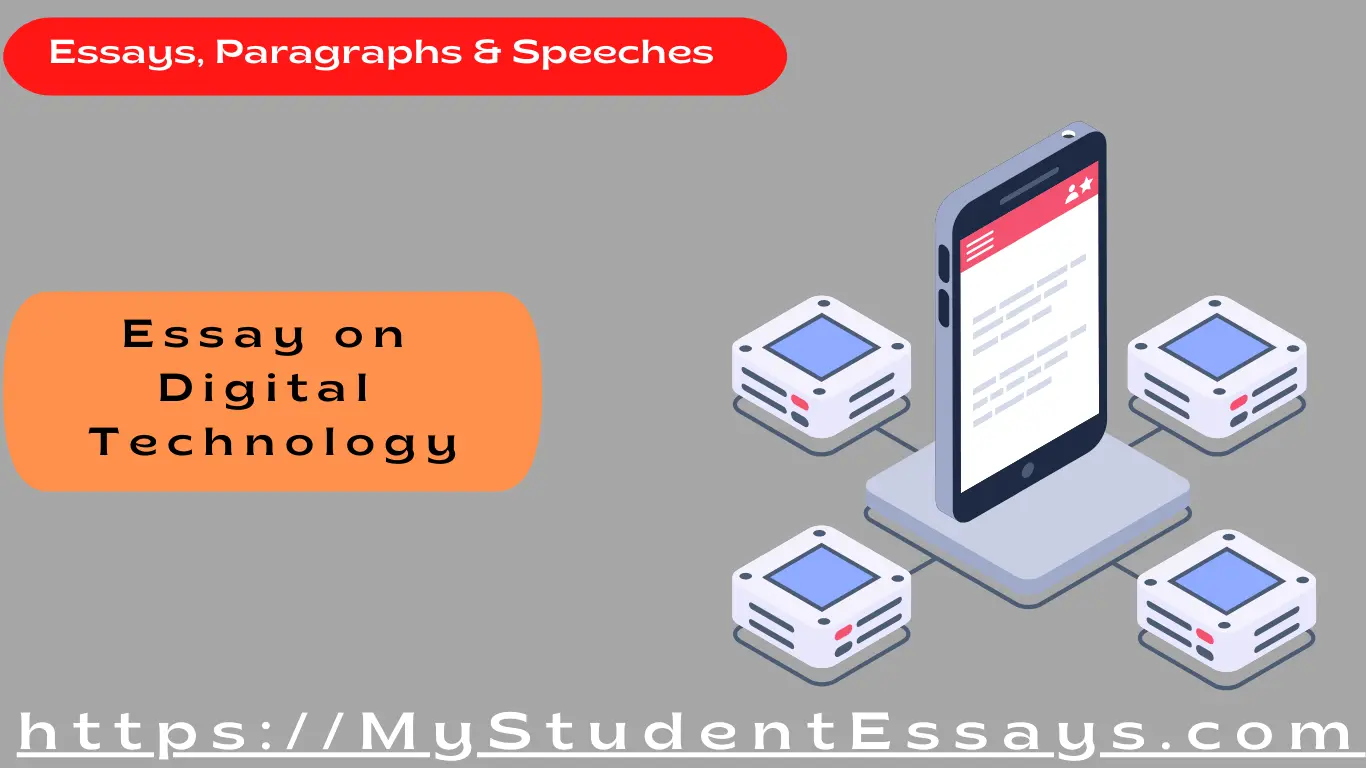

Essay on Digital Technology
Students are often asked to write an essay on Digital Technology in their schools and colleges. And if you’re also looking for the same, we have created 100-word, 250-word, and 500-word essays on the topic.
Let’s take a look…
100 Words Essay on Digital Technology
What is digital technology.
Digital technology refers to any system, device, or process that uses digital information. This includes computers, smartphones, and the internet. It’s a part of our daily lives.
Benefits of Digital Technology
Digital technology makes our lives easier. It helps us communicate, learn, and work. For example, we can send emails, learn online, and create digital art.
Challenges of Digital Technology
However, digital technology also has challenges. It can lead to less physical activity and face-to-face interaction. Plus, it can be hard to protect personal information online.
The Future of Digital Technology
The future of digital technology is exciting. We can expect more advancements that will continue to change our lives.
250 Words Essay on Digital Technology
Introduction.
Digital technology, a term encapsulating a wide array of software, hardware, and services, has revolutionized our world. It has altered how we communicate, learn, work, and entertain ourselves, shaping a new societal landscape.
The Evolution of Digital Technology
Digital technology has evolved exponentially over the past few decades. From the advent of personal computers and the internet, to the ubiquity of smartphones and the rise of artificial intelligence, each wave of technology has brought profound changes. This evolution has led to the digitization of various sectors, including education, healthcare, and commerce, thereby facilitating efficiency and convenience.
Impact on Society
The impact of digital technology on society is significant. It has democratized information, breaking down geographical and socio-economic barriers. Moreover, it has fostered global connectivity, enabling collaboration and interaction on an unprecedented scale. However, it also presents challenges such as privacy concerns and digital divide, necessitating thoughtful policy-making and ethical considerations.
Future Prospects
The future of digital technology is exciting, with emerging fields like quantum computing, virtual reality, and blockchain promising to further transform our lives. Nonetheless, it is crucial to ensure that this digital revolution is inclusive and sustainable, balancing technological advancement with societal well-being.
In conclusion, digital technology, while presenting certain challenges, offers immense potential to reshape our world. As we navigate this digital age, it is incumbent upon us to harness this potential responsibly, ensuring that the benefits of digital technology are accessible to all.
500 Words Essay on Digital Technology
Introduction to digital technology.
Digital technology, an umbrella term encompassing a myriad of devices, systems, and platforms, has revolutionized the world. It has transformed how we communicate, work, learn, and entertain ourselves, influencing every facet of our lives. This essay delves into the essence, benefits, and challenges of digital technology.
Understanding Digital Technology
Digital technology refers to any system, device, or process that uses a binary, numeric, or digital approach to create, store, process, and communicate information. It includes a broad range of technologies, such as computers, smartphones, digital televisions, email, robots, artificial intelligence, the Internet, and more. It is the cornerstone of the Information Age, underpinning the rapid exchange of information globally.
Digital technology has brought about numerous benefits. Firstly, it has enhanced communication. Digital platforms like email, social media, and instant messaging allow for instantaneous, affordable, and efficient communication across the globe. Secondly, digital technology has revolutionized education. Online learning platforms, digital textbooks, and educational apps have made education more accessible and personalized.
Furthermore, digital technology has transformed the business landscape. E-commerce, digital marketing, and remote working tools have opened new avenues for business growth and flexibility. Lastly, digital technology has also made significant strides in healthcare, with telemedicine, electronic health records, and digital diagnostic tools improving healthcare delivery.
Despite its numerous benefits, digital technology also poses significant challenges. Privacy and security concerns are at the forefront, with cybercrime, data breaches, and identity theft becoming increasingly prevalent. Additionally, the digital divide, the gap between those with access to digital technology and those without, exacerbates social and economic inequalities.
Moreover, the over-reliance on digital technology can lead to health issues, including digital eye strain and mental health problems. The rapid pace of technological change also presents challenges, as individuals and businesses struggle to keep up with the latest trends and developments.
Conclusion: A Balanced Perspective on Digital Technology
In conclusion, digital technology, while transformative and beneficial, also presents significant challenges that society must address. It is crucial to approach digital technology with a balanced perspective, acknowledging its immense potential to drive progress and innovation, while also recognizing and mitigating its risks. As digital technology continues to evolve at a rapid pace, fostering digital literacy and promoting responsible digital citizenship will be key to harnessing its potential responsibly and equitably.
In the future, we must strive to create a digital world that is secure, inclusive, and beneficial for all. This will require concerted efforts from all stakeholders, including individuals, businesses, governments, and international organizations. The journey is complex, but the potential rewards are immense, promising a future where digital technology serves as a tool for empowerment, progress, and prosperity.
That’s it! I hope the essay helped you.
If you’re looking for more, here are essays on other interesting topics:
- Essay on Dependence on Technology
- Essay on Advantages and Disadvantages of Modern Technology
- Essay on School Environment
Apart from these, you can look at all the essays by clicking here .
Happy studying!
Leave a Reply Cancel reply
Your email address will not be published. Required fields are marked *
Save my name, email, and website in this browser for the next time I comment.
Student Essays

4 Creative Essays on Digital Technology [ Importance & Benefits ]
Digital technology is the driving force in current socio economic development. It has assumed the tremendous importance in our daily life. The Following Essay on Digital Technology has been written to highlight the importance and benefits of digital technology in our daily lives and how the students can take benefit from digital technology
Essay on Digital Technology | Importance, Usages & Benefits of Digital Technology in Life
Digital technology refers at innovation in every field of our life. The technology has brought drastic changes in the way we used to live our life. There are various benefits of digital technology which has made our life easier and more comfortable than ever before.

There are endless advantages of using digital technology in our life. Firstly, with the help of internet, we can easily connect with people from all over the world. This has helped us to build strong relationships with people who are far away from us. Secondly, digital technology has enabled us to access information anytime and anywhere. We can now easily get the information we need without having to go through any trouble.
>>>> Read Also: “ Paragraph on Television ”
Thirdly, digital technology has made it possible for us to do many tasks conveniently and quickly. For example, we can now shop for our favourite products online without having to go out. Lastly, digital technology has helped us to stay connected with the latest news and trends happening all over the world. We can now easily get information about any topic we are interested in.
Benefits of Digital Technology for Students
There are many ways in which students can take benefits from digital technology of today. Firstly, internet has made it possible for students to access information about any topic they are interested in. They can now easily get information about any subject they are studying without having to go through any trouble.
Secondly, digital technology has enabled students to connect with people from all over the world. This has helped them to build strong relationships with people who are far away from them. Thirdly, digital technology has made it possible for students to do many tasks conveniently and quickly. For example, they can now shop for their favourite products online without having to go out. Lastly, digital technology has helped students to stay connected with
Thus, it is evident that digital technology has brought many benefits in our life. We can enjoy a better and more comfortable life with the help of digital technology.
Short Essay on Digital Technology:
Digital technology has revolutionized the world we live in today. It has transformed how we communicate, work, and access information. From smartphones to computers, digital technology is an integral part of our daily lives.
One of the biggest advantages of digital technology is its ability to connect people from different parts of the world. With just a few clicks, we can now communicate with someone on the other side of the planet. This has made it easier for businesses to expand globally and for individuals to stay connected with their loved ones no matter where they are.
Another major impact of digital technology is seen in the workplace. With the rise of automation and artificial intelligence, many tasks that were previously done by humans can now be done more efficiently by machines. This has led to increased productivity and streamlined processes in various industries.
However, with the increasing reliance on digital technology, there are also concerns about its potential negative effects. One of the biggest challenges is cybersecurity. As more and more data is being stored online and shared through digital platforms, it has become crucial to protect this sensitive information from cyber attacks.
Moreover, there are also concerns about the impact of digital technology on our physical health. With the rise of sedentary lifestyles due to excessive screen time, people are facing various health issues such as obesity and eye strain.
On a positive note, digital technology has also opened up new opportunities for education and learning. With online courses and educational platforms, individuals can now access knowledge and resources from anywhere in the world. This has made education more accessible and has also allowed for personalized learning.
In conclusion, digital technology has transformed our world in many ways. It has brought people closer, increased efficiency in various industries, and opened up new opportunities. However, it is important to use digital technology responsibly and address its potential negative effects to ensure a better future for generations to come.
We must embrace the benefits of digital technology while being mindful of its implications on our society and planet as a whole. So, let’s continue to harness the power of digital technology for positive change and progress. Let’s keep innovating and adapting to make the most out of this technological revolution.
Paragraph on Digital Technology:
Digital technology has transformed the way we live and work in ways that were unimaginable just a few decades ago. From our personal lives to businesses, digital technology has become an integral part of our daily routines.
In the past, communication was limited to physical letters or face-to-face interactions. Today, with the advancements in digital technology, we can instantly connect with people from all over the world through various platforms such as email, social media, and messaging apps. This has made communication faster, easier and more efficient than ever before.
Another area where digital technology has greatly impacted our lives is entertainment. With the rise of streaming services like Netflix, Hulu, and Amazon Prime Video, we no longer have to wait for a specific time slot on TV to watch our favorite shows or movies. We now have access to a vast library of content at our fingertips, giving us the freedom to watch what we want, when we want.
Digital technology has also revolutionized the way we do business. With the rise of e-commerce platforms like Amazon and eBay, buying and selling goods and services has become more convenient than ever before. This has not only made shopping easier for consumers but has also opened up new opportunities for businesses to reach a global market.
With the advent of social media platforms like Facebook, Instagram, and Twitter, businesses can now directly connect with their target audience and create personalized marketing strategies. This allows for more effective and targeted advertising, resulting in better customer engagement and increased sales.
Moreover, digital technology has significantly improved our access to information. With just a few clicks, we can access a wealth of knowledge and resources on the internet, making it easier for us to learn and stay informed about various topics.
In addition to its impact on communication, entertainment, business, and education, digital technology has also transformed the way we manage our daily tasks. From online banking and bill payments to grocery shopping and virtual meetings, almost every aspect of our lives can now be managed through digital platforms.
However, with all these benefits come some challenges as well. The over-reliance on digital technology has led to concerns about privacy and security. As more personal data is shared online, there is a risk of identity theft and cyber attacks. It is crucial for individuals and organizations to prioritize cybersecurity and take necessary precautions to protect sensitive information.
In conclusion, digital technology has undoubtedly made our lives easier and more efficient in many ways. Its impact on communication, entertainment, business, education, and daily tasks is undeniable.
Argumentative Essay on Digital Technology:
Over the years, digital technology has revolutionized our everyday lives. From communication to education and entertainment, technology has made its way into every aspect of modern living. While many argue that digital technology has brought about numerous benefits, others believe it is having a negative impact on society. In this essay, we will explore both sides of the argument and discuss the effects of digital technology on our society.
Positive Impacts
One of the major benefits of digital technology is its ability to connect people from all around the world. Through social media networks like Facebook, Twitter, and Instagram, individuals can stay in touch with friends and family regardless of their location.
This has greatly improved communication between loved ones and allows people to share their experiences with each other. Moreover, digital technology has also made it possible for businesses to expand their reach and connect with a global audience, resulting in increased opportunities and economic growth.
In addition to this, digital technology has greatly enhanced access to information and education. With the rise of e-learning platforms and online resources, individuals can now easily educate themselves on various subjects without having to physically attend a traditional classroom.
This has not only made education more accessible but also more affordable for many people. Furthermore, digital technology has also improved healthcare services through tele-medicine, making it easier for patients in remote areas to receive medical advice and treatment from qualified professionals.
Negative Impacts
Despite its benefits, digital technology has also brought about some negative effects on society. One of the biggest concerns is the impact it has on our social interactions. With the rise of social media, many people are spending more time on their devices and less time interacting face-to-face with others. This can lead to feelings of isolation and loneliness, especially among younger generations who have grown up in a digital world.
Moreover, there is also growing concern about the effects of excessive screen time on children’s development. Studies have shown that prolonged use of digital devices can negatively impact cognitive abilities, attention span, and social skills in young children.
In addition, the constant exposure to unrealistic beauty standards and curated lives on social media can also have a negative impact on individuals’ self-esteem and mental health.
In conclusion, while digital technology has greatly improved our lives in many ways, it also has its drawbacks. It is important for us to recognize and address the negative impacts it may have on our society, especially when it comes to social interactions and mental health.
>>> Related Post: “ Essay on Smart Phone “
As we continue to embrace digital technology, we must also be mindful of finding a balance between its benefits and limitations in order to create a healthier and more connected society.
Leave a Comment Cancel reply
Save my name, email, and website in this browser for the next time I comment.

Sample Essays on Technology (300, 500, and 1000 Words)
- July 10, 2024
Dr. Marvin L. Smith
In today’s rapidly evolving digital landscape, the ability to articulate thoughts on technology’s impact on our world is becoming increasingly important. Whether you’re a student working on a class assignment, a researcher preparing a paper, or a professional crafting a report, understanding how to write effectively about technology at various lengths is a valuable skill.
This article presents three sample essays on the topic of technology, each tailored to a specific word count: 300, 500, and 1000 words. These essays serve as models to demonstrate how the same subject can be approached with different levels of depth and detail, depending on the required length.
The 300-word essay offers a concise overview, touching on key points about technology’s influence on our lives. The 500-word version allows for a more detailed exploration of these themes, while the 1000-word essay provides a comprehensive analysis, delving into nuanced aspects of technology’s impact across various sectors.
By examining these samples, readers can gain insights into effective essay structure, the art of scaling content to meet word count requirements, and techniques for maintaining coherence and depth at different lengths. Whether you’re looking to craft a brief summary or an in-depth analysis, these examples will guide you in articulating your thoughts on technology’s role in shaping our present and future.
As you read through these sample essays, pay attention to how ideas are introduced, developed, and concluded at each length. Notice how additional details, examples, and perspectives are incorporated as the word count increases, providing a roadmap for your own writing endeavors on this ever-relevant topic.
Sample Essay on Technology (300, 500, and 1000 Words)
The following are three sample essays on technology, each crafted to demonstrate effective writing at different lengths

Technology: Shaping Our Present and Future (300 words)
Technology has become an integral part of our daily lives, revolutionizing the way we work, communicate, and interact with the world around us. From smartphones to artificial intelligence, technological advancements have transformed nearly every aspect of society, bringing both unprecedented opportunities and complex challenges.
One of the most significant impacts of technology is in the realm of communication. The internet and mobile devices have made it possible to connect with people across the globe instantly, breaking down geographical barriers and fostering global collaboration. Social media platforms have changed how we share information and maintain relationships, though they also raise concerns about privacy and the spread of misinformation.
In the workplace, technology has dramatically increased productivity and efficiency. Automation and artificial intelligence are streamlining processes and enabling businesses to operate on a global scale. However, these advancements also raise questions about job displacement and the need for workers to continuously adapt their skills to remain relevant in an evolving job market.
Education has been transformed by technology, with online learning platforms and digital resources making knowledge more accessible than ever before. Students can now access a wealth of information at their fingertips, collaborate on projects remotely, and engage with interactive learning tools that cater to diverse learning styles.
While the benefits of technology are numerous, it also presents challenges. Issues such as cybersecurity threats, digital addiction, and the environmental impact of electronic waste require careful consideration and proactive solutions.
As we look to the future, emerging technologies like quantum computing, biotechnology, and space exploration promise to push the boundaries of human achievement even further. It is crucial that we approach these advancements with a balance of enthusiasm and ethical consideration, ensuring that technology continues to serve humanity’s best interests while mitigating potential risks.
Technology: Transforming Our World (500 words)
In the 21st century, technology has become the driving force behind unprecedented changes in human society. From the way we communicate and work to how we learn and entertain ourselves, technological advancements have reshaped nearly every facet of our lives. This digital revolution brings with it a myriad of opportunities and challenges that are continually evolving as innovation pushes forward at an ever-increasing pace.
One of the most profound impacts of technology is in the realm of communication. The internet, coupled with mobile devices, has created a globally connected world where information flows freely across borders. Social media platforms have revolutionized how we share experiences, express opinions, and maintain relationships. While this interconnectedness has fostered global collaboration and cultural exchange, it also raises concerns about privacy, the spread of misinformation, and the potential for technology to exacerbate social divisions.
In the workplace, technology has dramatically increased productivity and efficiency. Automation and artificial intelligence are streamlining processes, enabling businesses to operate on a global scale with unprecedented speed and accuracy. Cloud computing has made it possible for teams to collaborate seamlessly across vast distances, while data analytics provides insights that drive informed decision-making. However, these advancements also raise questions about job displacement and the need for workers to continuously adapt their skills to remain relevant in an evolving job market.
The field of education has been transformed by technology, with online learning platforms and digital resources making knowledge more accessible than ever before. Students can now access a wealth of information at their fingertips, engage with interactive learning tools, and participate in virtual classrooms that transcend geographical boundaries. This democratization of education has the potential to reduce inequalities and provide opportunities for lifelong learning.
Healthcare is another sector experiencing a technological revolution. Telemedicine, wearable devices, and AI-assisted diagnostics are improving patient care and making healthcare more accessible. Genetic engineering and personalized medicine promise to revolutionize treatment approaches, while 3D printing technology is opening new possibilities in prosthetics and organ transplantation.
The entertainment industry has been radically altered by technology, with streaming services, virtual reality, and augmented reality offering immersive experiences that blur the lines between the digital and physical worlds. Gaming has evolved into a multi-billion dollar industry, with esports competitions drawing millions of viewers worldwide.
While the benefits of technology are numerous, it also presents significant challenges. Cybersecurity threats have become increasingly sophisticated, posing risks to individuals, businesses, and national security. The issue of digital addiction, particularly among younger generations, raises concerns about mental health and social development. Additionally, the rapid pace of technological change often outpaces regulatory frameworks, creating ethical dilemmas in areas such as data privacy, AI development, and biotechnology.
The environmental impact of technology is another critical consideration. While innovations in renewable energy and smart city design offer hope for a more sustainable future, the production and disposal of electronic devices contribute significantly to pollution and resource depletion.
As we look to the future, emerging technologies like quantum computing, nanotechnology, and space exploration promise to push the boundaries of human achievement even further. It is crucial that we approach these advancements with a balance of enthusiasm and ethical consideration, ensuring that technology continues to serve humanity’s best interests while mitigating potential risks.
In conclusion, technology’s role in shaping our world is undeniable and irreversible. As we navigate this digital age, it is essential to harness the power of innovation responsibly, addressing challenges proactively and working towards a future where technology enhances human potential and contributes to the greater good of society.
Technology: Revolutionizing Our World and Shaping Our Future (1000 words)
In the rapidly evolving landscape of the 21st century, technology stands as the cornerstone of unprecedented change, reshaping the very fabric of human society. From the smartphones in our pockets to the artificial intelligence powering industries, technological advancements have permeated every aspect of our lives, transforming how we communicate, work, learn, and interact with the world around us. This digital revolution brings with it a complex tapestry of opportunities and challenges, continually evolving as innovation pushes forward at an ever-accelerating pace.
Perhaps the most visible impact of technology is in the realm of communication. The internet, coupled with mobile devices, has created a globally connected world where information flows freely across borders at the speed of light. Social media platforms have revolutionized how we share experiences, express opinions, and maintain relationships, effectively shrinking the world into a global village. This interconnectedness has fostered unprecedented levels of global collaboration, cultural exchange, and the rapid dissemination of ideas.
However, this communication revolution is not without its drawbacks. The ease of sharing information has also facilitated the spread of misinformation and “fake news,” challenging our ability to discern truth from fiction. Privacy concerns have come to the forefront as personal data becomes a valuable commodity, often harvested and exploited by corporations and malicious actors alike. The addictive nature of social media platforms raises questions about their impact on mental health, particularly among younger generations.
In the professional sphere, technology has dramatically increased productivity and efficiency, reshaping the very nature of work. Automation and artificial intelligence are streamlining processes, enabling businesses to operate on a global scale with unprecedented speed and accuracy. Cloud computing has made it possible for teams to collaborate seamlessly across vast distances, while data analytics provides insights that drive informed decision-making.
The rise of remote work, accelerated by recent global events, has demonstrated the potential for technology to redefine traditional work structures. Virtual meetings, collaborative software, and secure networks have made it possible for many to work from anywhere, potentially reshaping urban landscapes and commuting patterns.
However, these advancements also raise critical questions about the future of employment. As automation and AI continue to evolve, concerns about job displacement loom large. The need for workers to continuously adapt their skills to remain relevant in an evolving job market has never been more pressing, highlighting the importance of lifelong learning and adaptability in the modern workforce.
The field of education has been profoundly transformed by technology, with online learning platforms and digital resources making knowledge more accessible than ever before. Students can now access a wealth of information at their fingertips, engage with interactive learning tools, and participate in virtual classrooms that transcend geographical boundaries. This democratization of education has the potential to reduce inequalities and provide opportunities for lifelong learning to people of all ages and backgrounds.
Adaptive learning technologies, powered by AI, are personalizing education to meet individual student needs, potentially revolutionizing how we approach teaching and learning. Virtual and augmented reality technologies are creating immersive learning experiences, bringing abstract concepts to life and enhancing engagement.
However, the digital divide remains a significant challenge, with disparities in access to technology and high-speed internet potentially exacerbating educational inequalities. Additionally, the shift to digital learning raises questions about the social and emotional aspects of education that are traditionally fostered in physical classrooms.
The healthcare sector is experiencing a technological revolution that promises to transform patient care and medical research. Telemedicine has made healthcare more accessible, allowing patients to consult with doctors remotely. Wearable devices and IoT sensors are enabling continuous health monitoring, shifting the focus from reactive to preventive care. AI-assisted diagnostics are improving the accuracy and speed of disease detection, while robotic surgery is enhancing precision in complex procedures.
Genetic engineering and personalized medicine are opening new frontiers in treatment approaches, tailoring therapies to individual genetic profiles. 3D printing technology is creating new possibilities in prosthetics, implants, and even organ transplantation. The use of big data in healthcare is facilitating large-scale medical research, potentially accelerating the discovery of new treatments and cures.
However, these advancements also raise ethical concerns, particularly regarding data privacy, the equitable distribution of these technologies, and the potential for genetic discrimination. The integration of AI in healthcare decision-making also raises questions about accountability and the role of human judgment in medical care.
The entertainment industry has been radically altered by technology, with streaming services, virtual reality, and augmented reality offering immersive experiences that blur the lines between the digital and physical worlds. The rise of on-demand content has changed viewing habits and challenged traditional media models. Gaming has evolved into a multi-billion dollar industry, with esports competitions drawing millions of viewers worldwide and virtual worlds becoming increasingly sophisticated.
Social media influencers and user-generated content have democratized content creation, allowing individuals to reach global audiences. However, this shift has also raised concerns about content quality, intellectual property rights, and the impact of constant entertainment availability on productivity and mental health.
While technology offers solutions to many environmental challenges, it also presents its own set of environmental concerns. Innovations in renewable energy, smart grid systems, and energy-efficient devices are crucial in the fight against climate change. Smart city technologies promise to optimize resource use and reduce urban environmental footprints.
However, the production and disposal of electronic devices contribute significantly to pollution and resource depletion. The energy consumption of data centers and blockchain technologies raises questions about the sustainability of our digital infrastructure. Balancing technological progress with environmental stewardship remains a critical challenge for the coming decades.
As technology continues to advance at a rapid pace, it often outstrips our ability to fully understand its implications or develop appropriate regulatory frameworks. Ethical dilemmas abound in areas such as AI development, data privacy, biotechnology, and the use of technology in warfare. The potential for technology to exacerbate social inequalities or be used for surveillance and control raises important questions about power dynamics in the digital age.
Looking to the future, emerging technologies like quantum computing, nanotechnology, and space exploration promise to push the boundaries of human achievement even further. The potential for these technologies to solve global challenges, from climate change to disease, is immense. However, they also carry risks that must be carefully managed.
As we navigate this digital age, it is clear that technology’s role in shaping our world is both undeniable and irreversible. The challenges we face are complex and multifaceted, requiring thoughtful consideration and proactive solutions. It is crucial that we approach technological advancements with a balance of enthusiasm and ethical consideration, ensuring that innovation serves humanity’s best interests while mitigating potential risks.
The future we create will depend on our ability to harness the power of technology responsibly, addressing challenges head-on, and working towards a world where technological progress enhances human potential and contributes to the greater good of society. As we stand on the brink of new technological frontiers, our choices today will shape the world of tomorrow, making it imperative that we proceed with wisdom, foresight, and a commitment to the wellbeing of all.
Ready to transform your writing experience?
Sign up for Blainy today and start writing your papers with confidence!
About the Author:

How to Fix and Prevent Run-on Sentences

Research Gaps: How to Identify, Types, and Examples Explained

Is Using ChatGPT Cheating?

Blainy vs. ChatGPT

FANBOYS: Coordinating Conjunctions

Research Findings Guide: Examples, Types, and Structuring Tips

Academic writing made brilliantly simple, always.
Limited time offers 🎁🎉.
Black Friday Sale
Cyber Monday Sale
Discover More
50+ Free AI Tools
Feature Updates
✉ [email protected]
✆ +971 50 760 0820
📍190 Hackett Inlet, Eastern Region, Dubai, UAE.
Terms & Condition
Privacy Policy
Copyright © 2024 Blainy
Home — Essay Samples — Information Science and Technology — Impact of Technology — The Impact of Technology in Our Daily Life
The Impact of Technology in Our Daily Life
- Categories: Impact of Technology
About this sample

Words: 644 |
Published: Aug 24, 2023
Words: 644 | Page: 1 | 4 min read
Table of contents
Introduction, communication and connectivity, work and productivity, education and learning, entertainment and leisure, health and well-being, daily tasks and convenience, environmental impact, cultural and social changes.

Cite this Essay
To export a reference to this article please select a referencing style below:
Let us write you an essay from scratch
- 450+ experts on 30 subjects ready to help
- Custom essay delivered in as few as 3 hours
Get high-quality help

Verified writer
- Expert in: Information Science and Technology
+ 120 experts online
By clicking “Check Writers’ Offers”, you agree to our terms of service and privacy policy . We’ll occasionally send you promo and account related email
No need to pay just yet!
Related Essays
3 pages / 1249 words
2 pages / 860 words
1 pages / 652 words
3 pages / 1757 words
Remember! This is just a sample.
You can get your custom paper by one of our expert writers.
121 writers online
Still can’t find what you need?
Browse our vast selection of original essay samples, each expertly formatted and styled
Related Essays on Impact of Technology
The relationship between technology and jobs has become a topic of intense debate and speculation in recent years. This essay delves into the intricate interplay between technological advancements and employment, exploring the [...]
The internet is an ubiquitous presence in modern society, revolutionizing the way we access information, connect with others, and conduct business. However, this technological marvel also has its negative implications. In this [...]
Technology has significantly transformed various sectors, and the school system is no exception. In recent years, the integration of technology in education has led to improved access to information, enhanced teaching and [...]
"Is Google Making Us Stupid" is an article written by Nicholas Carr that discusses the impact of the internet on our cognitive abilities. The article explores how the internet, particularly search engines like Google, is [...]
Technology is the source of vast knowledge and with proper skills used in the accomplishment of our various needs and information. We use technology to accomplish various tasks in our daily lives, in brief; we can describe [...]
Have you ever felt alone, sad, depressed, or in a sense, like you’re not wanted? Now ask yourself, how long have you been spending on your phone, computer or just social media alone? In our generation we have access to the [...]
Related Topics
By clicking “Send”, you agree to our Terms of service and Privacy statement . We will occasionally send you account related emails.
Where do you want us to send this sample?
By clicking “Continue”, you agree to our terms of service and privacy policy.
Be careful. This essay is not unique
This essay was donated by a student and is likely to have been used and submitted before
Download this Sample
Free samples may contain mistakes and not unique parts
Sorry, we could not paraphrase this essay. Our professional writers can rewrite it and get you a unique paper.
Please check your inbox.
We can write you a custom essay that will follow your exact instructions and meet the deadlines. Let's fix your grades together!
Get Your Personalized Essay in 3 Hours or Less!
We use cookies to personalyze your web-site experience. By continuing we’ll assume you board with our cookie policy .
- Instructions Followed To The Letter
- Deadlines Met At Every Stage
- Unique And Plagiarism Free
The Digital Divide Essay: the Challenge of Technology and Equity
Introduction, what is the digital divide, causes of the digital divide, reducing the divide, digital divide: essay conclusion, works cited.
The invention of the computer and the subsequent birth of the internet have been seen as the most significant advances of the 20th century.
Over the course of the past few decades, there has been a remarkable rise in the use of computers and the internet. Sahay asserts that the ability of computing technologies to traverse geographical and social barriers has resulted in the creation of a closer knit global community (36). In addition to this, the unprecedented high adoption rate of the internet has resulted in it being a necessity in the running of our day to day lives.
However, there have been concerns due to the fact that these life transforming technologies are disparately available to people in the society. People in the high-income bracket have been seen to have a higher access to computer and the internet. This paper argues that the digital divide does exist and sets out to provide a better understanding of the causes of the same. Solutions to this problem are also addressed by this paper.
The term divide is mostly used to refer to the economic gap that exists between the poor and richer members of the society. In relation to technology, the OECD defines digital divide as ” the gap between individuals, households, businesses and geographic areas at different socio-economic levels with regard both to their opportunities to access information and communication technologies (ICTs) and to their use of the Internet for a wide variety of activities.” (5). As such, the digital divide refers to the disparities in access of communication technology experienced by people.
While the respective costs of computers and internet access have reduced drastically over the years, these costs still remain significantly expensive for some people in the population. As a result of this, household income is still a large determinant of whether internet access is available at a home.
Income is especially a large factor in developing countries where most people still find the cost of owning a PC prohibitive. However, income as a factor leading to the digital divide is not only confined to developing nations. A report by the NTIA indicated that across the United States, internet access in homes continued to be closely correlated with the income levels (3).
Education also plays a key role in the digital divide. The National Telecommunications and Information Administration indicates that in America, certain groups such as Whites and Asian Americans who possess higher educational levels have higher levels of both computer ownership as well as access to the internet (3). This is because the more educated members of the society are having a higher rate of increased access to computers and internet access as opposed to the less educated.
A simple increase in the access to computer hardware resources through the production of low cost versions of information technology which is affordable to many does not necessarily result in a reduction in the digital divide. This is because in addition to the economic realities there are other prominent factors.
The lack of technological knowhow has been cited as further widening the digital divide. This means that even with access to technology, people might still be unable to make effective usage of the same. Sahay best expresses this problem by asserting that “just by providing people with computers and internet access, we cannot hope to devise a solution to bridge the digital divide.” (37).
Another cause of the digital divide is the social and cultural differences evident in most nations in the world. One’s race and culture have been known to have a deep effect on their adoption and use of a particular technology (Chen and Wellman 42).
This is an opinion which is shared by Sahay who notes that people with fears, assumptions or pre-conceived notions about technology may shy away from its usage (46). As such, people can have the economic means and access to computers and the internet but their culture may retard their use of the same.
The digital divide leads to a loss of the opportunity by many people to benefit from the tremendous economic and educational opportunities that the digital economy provides (NTIA 3). As such, the reduction of this divide by use of digital inclusion steps is necessary for everyone to share in the opportunities provided. As has been demonstrated above, one of the primary causes of the digital divide is the income inequality between people and nations.
Most developing countries have low income levels and their population cannot afford computers. To help alleviate this, programs have been put in place to reduce the cost of computers or even offer them for free to the developing countries. For example, a project by Quanta Computer Inc in 2007 set out to supply laptops to developing world children by having consumers in the U.S. buy 2 laptops and have one donated to Africa (Associated Press).
Studies indicate that males are more likely than females in the comparable population to have internet access at home mostly since women dismiss private computer and internet usage (Korupp and Szydlik 417). The bridging of this gender divide will therefore lead to a reduction in the digital divide that exists.
In recent years, there has been evidence that the gender divide is slowly closing up. This is mostly as a result of the younger generation who use the computer and internet indiscriminately therefore reducing the strong gender bias that once existed. This trend should be encouraged so as to further accelerate the bridging of the digital divide.
As has been illustrated in this paper, there exist non economic factors that may lead to people not making use of computers hence increasing the digital divide. These factors have mostly been dismissed as more attention is placed on the income related divide. However, dealing with this social and cultural related divides will also lead to a decrease in the divide. By alleviating the fears and false notions that people may have about technology, people will be more willing to use computers and the internet.
A divide, be it digital or economic acts as a major roadblock in the way for economic and social prosperity. This paper set out to investigate the digital divide phenomena. To this end, the paper has articulated the issue of digital divide, its causes and solutions to the problem.
While some people do suggest that the digital divide will get bridged on its own as time progresses, I believe that governments should take up affirmative action and fund projects that will result in a digitally inclusive society. Bridging of the digital divide will lead to people and nations increasingly being included in knowledge based societies and economies. This will have a positive impact to every community in the entire world.
Associated Press. Hundred-Dollar Laptop’ on Sale in Two-for-One Deal. 2007. Web.
Chen, Wenhong and Wellman, Barry. The Global Digital Divide- Within and Between Countries . IT & SOCIETY, VOLUME 1, ISSUE 7. 2004, PP. 39-45.
Korupp, Sylvia and Szydlik, Marc. Causes and Trends of the Digital Divide. European Sociological Review Vol. 21. no. 4, 2005.
National Telecommunications and Information Administration (NTIA). Falling Through the Net: Towards Digital Inclusion . 2000. Web.
Organization for Economic Cooperation and Development (OECD). Understanding the Digital Divide . 2001. Web.
Sahay, Rishika. The causes and Trends of the Digital Divide . 2005. Web.
- Digital Theory and Aesthetics Space and Network Cultures in the Urban Environment
- The Impact of Technology on Global Business
- Bridging the Line Between a Human Right and a Worker’s Choice
- Fixing the Digital Divide in the US
- The Importance of Improving the Digital Divide between All Countries of Different Socio-Economic Climates
- Excess Use of Technology and Motor Development
- People Have Become Overly Dependent on Technology
- Technology and Negative Effects
- The Concept and Effects of Evolution of Electronic Health Record System Software
- Americans and Digital Knowledge
- Chicago (A-D)
- Chicago (N-B)
IvyPanda. (2019, February 7). The Digital Divide. https://ivypanda.com/essays/the-digital-divide/
"The Digital Divide." IvyPanda , 7 Feb. 2019, ivypanda.com/essays/the-digital-divide/.
IvyPanda . (2019) 'The Digital Divide'. 7 February.
IvyPanda . 2019. "The Digital Divide." February 7, 2019. https://ivypanda.com/essays/the-digital-divide/.
1. IvyPanda . "The Digital Divide." February 7, 2019. https://ivypanda.com/essays/the-digital-divide/.
Bibliography
IvyPanda . "The Digital Divide." February 7, 2019. https://ivypanda.com/essays/the-digital-divide/.
- To find inspiration for your paper and overcome writer’s block
- As a source of information (ensure proper referencing)
- As a template for you assignment

IMAGES
VIDEO
COMMENTS
This essay delves into the essence, benefits, and challenges of digital technology. Understanding Digital Technology Digital technology refers to any system, device, or process that uses a binary, numeric, or digital approach to create, store, process, and communicate information.
We live in a rapidly changing, highly technological world, where the present day digital technology affects several parts of our lives. At work, people use digital technology to communicate, gather information and solve problems relevant to their place of work.
Digital technology refers to the use of digital systems, such as computers and the internet, to create, store, process, and transmit information. Its importance lies in revolutionizing communication, improving efficiency, and enabling innovations in various industries.
Digital technology has changed the world and impacted almost every industrial field on our planet. New ideas are implemented through the use of more effective sources and tools, which result in an improved outcome.
This article presents three sample essays on the topic of technology, each tailored to a specific word count: 300, 500, and 1000 words. These essays serve as models to demonstrate how the same subject can be approached with different levels of depth and detail, depending on the required length.
This essay focuses on the impact of digital technology on our culture with special emphasis on how youths have been affected by various aspects of digital technology. To achieve this objective, views from three authors have been considered through comparative analysis.
So, the following essay covers the issues relating to the revolution of information and the challenges that hinder the effective development of digital technology. History and timeline of digital technology
A Digital Revolution: Enter the era of smartphones, AI, and the Internet of Things, where technology is the driving force. Join me as we explore how technology has transformed our lives and the profound impact it has on society.
The impact of technology on daily life is multifaceted, touching upon communication, work, education, entertainment, health, and more. As we navigate the digital landscape, it is imperative to recognize the opportunities and challenges that technology brings.
Searching for a good essay on digital divide? Learn about the causes, challenges, and solutions for this issue from our essay about digital divide.